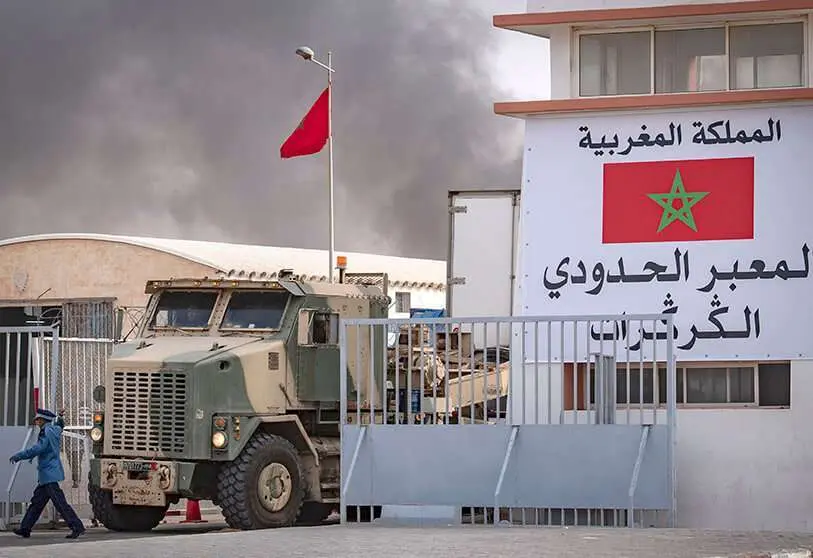Marruecos refuerza su presencia en el paso de Guerguerat

One year after the Guerguerat military operation, which broke a decades-long ceasefire in Western Sahara, Morocco has reinforced its presence with the installation of a checkpoint in the so-called "buffer zone" between the Sahrawi and Mauritanian territories.
The EFE news agency has been able to verify in situ the changes at this crossing point since the Moroccan operation launched on 13 November 2020 to expel Polisario Front militants, who had been blocking the road that crosses the strip of no man's land - the "buffer zone" - between the two borders for several weeks.

Since then, the Polisario has broken the truce agreed with Morocco in 1991 and tensions between Morocco and Algeria - which hosts the Sahrawi pro-independence authorities and their refugee camps - have reached levels not seen in decades.
On 9 November, four days before the anniversary of the Guerguerat clashes, Morocco authorised travellers, and not just professional carriers, to cross the border, which had been closed for months as a result of the pandemic. Efe was the first media outlet to do so since the reopening.

The crossing is made up of two border crossing points, one on the Saharan side and the other on the Mauritanian side, with a strip of sandy desert almost four kilometres in between.
In the past year, Morocco has allowed urban development projects to build a border town on the Sahrawi side, authorising the opening of new petrol stations (there were two and in the past year three have been added), shops, money remittance agencies, restaurants and butchers, and even a mosque that is in the process of being built.
But their moves to settle on the border, considered illegal by the Polisario because it is not one of the UN-recognised crossing points, began some time ago.
Three years before the November 2020 military operation, Morocco paved the first two and a half kilometres of road in the "buffer zone", while the rest, on the Mauritanian side, is still a dirt track.
Over the past year, Morocco has extended its influence over the buffer zone by establishing a checkpoint at the end of the road where the asphalt ends, consisting of two large metal containers. It is manned by Moroccan Gendarmerie officers, who inspect all vehicles with police dogs.

Nowadays, passing through Guerguerat is like passing through any other border crossing point. The Moroccan security services search travellers' luggage, check their travel documents and stamp their entry or exit in a routine and fluid atmosphere.
In the surrounding area, on the other hand, there is a heavy Moroccan and Mauritanian military presence on both sides of the border to prevent infiltration by Polisario fighters and to prevent sub-Saharan migrants from passing through.
Once through the no-man's-land, the Mauritanian border meets all security and customs control requirements. Mauritania has benefited from Moroccan assistance to pave another road connecting its border with the strategic Nouadhibou-Nouakchott road.
The crossing opens at nine in the morning and closes at seven in the evening. Although most of its users are goods trucks travelling between Morocco and sub-Saharan Africa, there are also passengers from countries in the region and even some tourists making their debut at the opening to visitors.
Along the few kilometres that separate the two border crossing points, a minibus operates, but mostly illegal Mauritanian taxi drivers who do not manage to enter Moroccan-controlled territory but do so comfortably in Mauritanian territory.
Mohamed Maalainein is one of them. A retired soldier, he explained to Efe that he has been working for 20 years driving people from one side of the "buffer zone" to the other. He believes that the area has improved with the asphalting of the road and the increase in security.
A 40-year-old Moroccan haulier, Hicham Zine, says the drivers "were abused by the Polisario", which considers the part of the former Spanish colony under Moroccan control to be an occupied zone.
"They forced you to give them money, they left you blocked and waiting without any justification and if you had any symbol of Morocco they forced you to take it off", he says.
The regulars at the crossing called Kandahar the "buffer zone", comparable in their eyes to the chaos that the Afghan city experienced under the Taliban. Ahmed A., another Moroccan truck driver, sums it up: "We suffered a lot in Kandahar. Sometimes, in order to get through, you had to pay criminals who forced us to give them 500 dirhams (about 50 euros).










